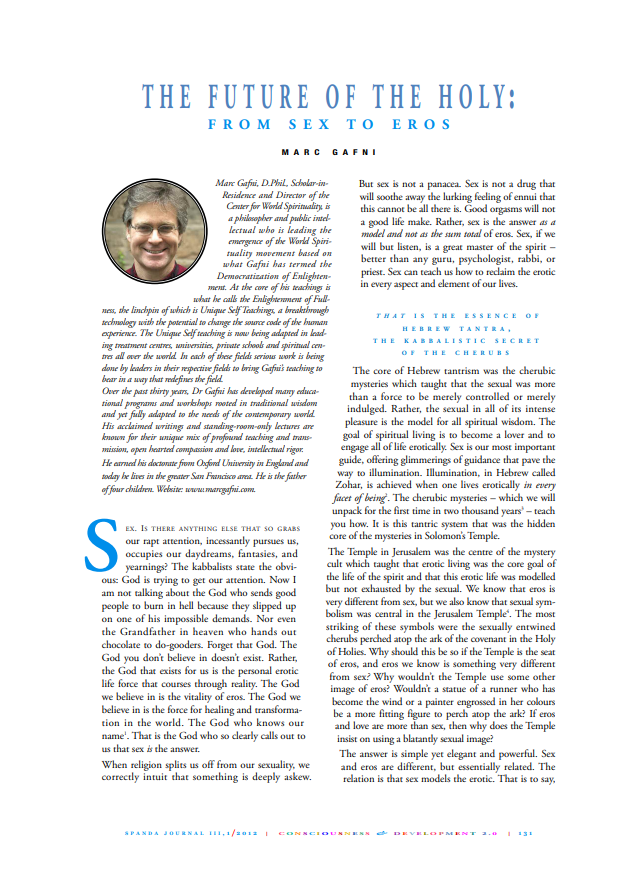Unique Self Dialogue: Ken Wilber & Marc Gafni, Part 4
The page you are trying to reach is part of our Great Library Stacks & Archives. If you already signed up for our FREE Great Library card, please log in to access this content.
If you are not yet a Library Card owner, you can sign up to get access.
Daily Wisdom: First things first
From Ken Wilber’s “A Spirituality That Transforms”:
Even though you and I might deeply believe that the most important function we can perform is to offer auhentic transformative spirituality, the fact is, much of what we have to do, in our capacity to bring decent spirituality into the world, is actually to offer more benign and helpful modes of translation. In other words, even if we ourselves are practicing, or offering, authentic transformative spirituality, nonetheless much of what we must first do is provide most people with a more adequate way to translate their condition. We must start with helpful translations, before we can effectively offer authentic transformations.
The reason is that if translation is too quickly, or too abruptly, or too ineptly taken away from an individual (or culture), the result, once again, is not breakthrough but breakdown, not relapse but collapse.
To read the whole article, see KenWilber.com.
Marc Gafni on Post-Postmodern Art: A New Article in Parabola Magazine
 By Marc Gafni
By Marc Gafni
Artist Claudia Kleefeld is not the first person to see the symbol of the spiral as being a portal to a vision of a coherent cosmos. She is original in that she is a first-rate, old-master-style artist with thirty years of training, who paints the spiral as an expression of an Eros of certainty that asserts the utter meaningfulness, depth, and order of the cosmos. Kleefeld’s paintings emerge from her own opened eye of the spirit and speak directly to the higher spiritual intuition of her viewers. Finally, Kleefeld is unusual in that she is part of an emergent form of art, which seeks to reveal the enchantment of a cosmos ”” a cosmos that is good, true, and beautiful.
I am delighted to present an article which celebrates the work of Claudia Kleefeld, one of the brightest shining lights in the universe of art today. My new article, “Post-postmodern Art: A Return to Belonging,” is now published in the latest issue of Parabola Magazine.
Daily Wisdom: Creation is in our hands

The Erotic and the Holy
Dr. Marc Gafni
Unique Self Video No. 7: Unique Self or Soul?
The page you are trying to reach is part of our Great Library Stacks & Archives. If you already signed up for our FREE Great Library card, please log in to access this content.
If you are not yet a Library Card owner, you can sign up to get access.
Daily Wisdom: Where is God?

The repair and healing of the world depends on our partnership with God. God steps back and says, “I cannot do it alone. I need you to be my messengers. Even more, I need you to be my eyes and ears and hands.”
When you see someone, and in the process give a person the gift of feeling seen in the world, then you are seeing with God’s eyes. When attention is paid and a person feels heard, then you are God’s ears. When you move to heal after seeing pain and hearing the cries of oppression, then divinity is visible and active in the world. The language of God is man. We are God’s love verbs in the world. Conversely, when you oppress and hurt, when you ignore the cries of the sufferer and turn a blind eye to evil, then you make God blind and deaf.
The Erotic and the Holy
Marc Gafni
Unique Self Video No. 6: Evolutionary We-Space
The page you are trying to reach is part of our Great Library Stacks & Archives. If you already signed up for our FREE Great Library card, please log in to access this content.
If you are not yet a Library Card owner, you can sign up to get access.
The Weekend of Loving Outrageously
The page you are trying to reach is part of our Great Library Stacks & Archives. If you already signed up for our FREE Great Library card, please log in to access this content.
If you are not yet a Library Card owner, you can sign up to get access.
Unique Self Dialogue: Ken Wilber & Marc Gafni, Part 3
The page you are trying to reach is part of our Great Library Stacks & Archives. If you already signed up for our FREE Great Library card, please log in to access this content.
If you are not yet a Library Card owner, you can sign up to get access.
Unique Self Video No. 5: The change that changes everything
The page you are trying to reach is part of our Great Library Stacks & Archives. If you already signed up for our FREE Great Library card, please log in to access this content.
If you are not yet a Library Card owner, you can sign up to get access.
Daily Wisdom: On corporate kindness

Yet, corporations in the end are made up of real people, and real people all have the potential to be lovers.
The following is an excerpt from an acceptance speech made by Howard Schultz, the chairman and chief global strategist of Starbucks.
“When I was in Israel, I went to Mea Shearim, the ultra-Orthodox area within Jerusalem. Along with a group of businessmen I was with, I had the opportunity to have an audience with Rabbi Finkel, the head of a yeshiva there. I had never heard of him and didn’t know anything about him. We went into his study and waited ten to 15 minutes for him. Finally, the doors opened.
What we did not know was that Rabbi Finkel was severely afflicted with Parkinson’s disease. He sat down at the head of the table, and, naturally, our inclination was to look away. We didn’t want to embarrass him.
We were all looking away, and we heard this big bang on the table: “Gentlemen, look at me, and look at me right now.” Now his speech affliction was worse than his physical shaking. It was really hard to listen to him and watch him. He said, “I have only a few minutes for you because I know you’re all busy American businessmen.” You know, just a little dig there.
Then he asked, “Who can tell me what the lesson of the Holocaust is?” He called on one guy, who didn’t know what to do–it was like being called on in the fifth grade without the answer. And the guy says something benign like, “We will never, ever forget.” And the rabbi completely dismisses him. I felt terrible for the guy until I realized the rabbi was getting ready to call on someone else. All of us were sort of under the table, looking away–you know, please, not me. He did not call me. I was sweating. He called on another guy, who had such a fantastic answer: “We will never, ever again be a victim or bystander.”
The rabbi said, “You guys just don’t get it. Okay, gentlemen, let me tell you the essence of the human spirit. As you know, during the Holocaust, the people were transported in the worst possible, inhumane way by railcar. They thought they were going to a work camp. We all know they were going to a death camp.
“After hours and hours in this inhumane corral with no light, no bathroom, cold, they arrived at the camps. The doors were swung wide open, and they were blinded by the light. Men were separated from women, mothers from daughters, fathers from sons. They went off to the bunkers to sleep.
“As they went into the area to sleep, only one person was given a blanket for every six. The person who received the blanket, when he went to bed, had to decide, ‘Am I going to push the blanket to the five other people who did not get one, or am I going to pull it toward myself to stay warm?'”
And Rabbi Finkel says, “It was during this defining moment that we learned the power of the human spirit, because we pushed the blanket to five others.”
And with that, he stood up and said, “Take your blanket. Take it back to America and push it to five other people.”
As our birthdays roll around, year after year, the accumulation of wealth and power seems more and more vapid and ridiculous. At each birthday, we ask with more urgency, “Did my last year have any lasting significance? Did I push my blanket to five people? Have I made progress in the search for a life that matters? Did I make a difference? Did I give something of important to the world? Was I a lover?”
The Erotic and the Holy
Marc Gafni
Unique Self Video No. 4: Without Unique Self, Life is Irrelevant
The page you are trying to reach is part of our Great Library Stacks & Archives. If you already signed up for our FREE Great Library card, please log in to access this content.
If you are not yet a Library Card owner, you can sign up to get access.
Marc Gafni’s “The Future of the Holy: From Sex to Eros” Appearing in Spanda Journal
 Marc Gafni was recently featured in Spanda Journal, the peer-reviewed biannual publication of the Spanda Foundation.
Marc Gafni was recently featured in Spanda Journal, the peer-reviewed biannual publication of the Spanda Foundation.
The Spanda Foundation offers publications related to “sustainable advancement of peace, knowledge, and understanding.”
Marc’s article, entitled “The Future of the Holy: From Sex to Eros,” begins like this:
“Sex. Is there anything else that so grabs our rapt attention, inessantly pursues us, occupies our daydreams, fantasies, and yearnings? The kabbalists state the obvious: God is trying to get our attention. Now I am not talking about the God who sends good people to burn in hell because they slipped up on one of his impossible demands. nor even the Grandfather in heaven who hands out chocolate to do-gooders. Forget that God. The God you don’t believe in doesn’t exist. Rather, the God that exists for us is the personal erotic life force that courses through reality. The God we believe in is the vitality of eros. The God we believe in is the force for healing and transformation in the world. The God who knows our name. That is the God who so clearly calls out to us that sex is the answer.”
For the entire article, click: SPANDAJOURNAL_C&D2.0_Marc_Gafni.
See: Gafni, M. (2012). “The Future of the Holy: from Sex to Eros”, Spanda Journal, ed. S. Momo, III,1: 131-139.
Unique Self Video No. 3: Reclaiming Obligation
The page you are trying to reach is part of our Great Library Stacks & Archives. If you already signed up for our FREE Great Library card, please log in to access this content.
If you are not yet a Library Card owner, you can sign up to get access.
Daily Wisdom: Room for “Other”
A sacred conversation between the fourth century Babylonian Wisdom masters:
“It is written that God withdraws his presence from the world to dwell in the empty space between the Cherubs in the Temple. But how could this be? Is it not also written that all of heaven, indeed all the space in the cosmos, is not enough to contain divinity? “Ah,” says Master Jose. “It is to be likened to lovers. When they quarrel even a palatial home is not enough for their needs, but when they love, they can make their bed even on the edge of a sword.”
The mystery of creation, of existence itself, is Tzimtzum.
Tzimtzum, meaning “withdrawal.” God creates the world by withdrawing to make space for the world. What is the motivating force of Tzimtzum? Both of our images give the same answer. The motivating force of tzimtzum is love.
Love is the force in the cosmos that allows God to step back and allow room for us. As with God, so with us. We are Homo Imago Dei who participate in the divine image – divine miniatures. In order for us to create a world, a relationship, we need to step back and create an empty space in which there is room for other, in which there is a place for the relationship to unfold. “Let us be close friends and there will be room.” If I love you, I need to know how to step back and make space for you. Tzimtzum is God saying, “You can choose – even if you choose against me.” This is the gift of love.
Marc Gafni
The Erotic and the Holy
Unique Self Video Teaching No. 2: Answering the Call
The page you are trying to reach is part of our Great Library Stacks & Archives. If you already signed up for our FREE Great Library card, please log in to access this content.
If you are not yet a Library Card owner, you can sign up to get access.
World Spirituality Unplugged: “What is a purpose-driven business?: John Mackey and Marc Gafni in Dialogue, Part 2”
 This is the second installment of World Spirituality Unplugged, a regular new column on this website which will feature highlights from the Center for World Spirituality’s substantial audio and video archives. The audio clip posted here (less than 10 minutes) is an excerpt from a 2010 dialogue between John Mackey and Marc Gafni, originally recorded for the Future of Love Teleseries, an online event co-sponsored by CWS.
This is the second installment of World Spirituality Unplugged, a regular new column on this website which will feature highlights from the Center for World Spirituality’s substantial audio and video archives. The audio clip posted here (less than 10 minutes) is an excerpt from a 2010 dialogue between John Mackey and Marc Gafni, originally recorded for the Future of Love Teleseries, an online event co-sponsored by CWS.
Marc Gafni, as you are well aware, is the Director and Scholar-in-Residence for the Center. John Mackey is not only the Chairman and CEO of a $4 billion Fortune 500 company, he is also Co-Chair of the Board of the Center for World Spirituality. Mackey was named the Ernst and Young Entrepreneur Of The Year in 2003. John is a strong believer in FLOW principles, including free market principles and empowerment management. He is also one of the most influential advocates in the movement for organic food. Whole Foods was the first grocery chain to set standards for humane animal treatment.
Following an earlier discussion on “What’s love got to do with business,” the duo continue in a conversation about conscious capitalism.
Daily Wisdom: The refusal to love always means the desperate desire to retain control at all costs
This spiritual law of the universe plays itself out in many hidden ways which you need to recognize if you truly want to return to love. I want to outline for you areas where, in order to become a lover, you need to give up control. Just as the Hebrew mystics portrayed the God lover as stepping back in order to make space for world, so do we need to step back to create space for our love to flow. First, if we love ourselves, we have to give up our need to be perfect. If you don’t love yourself then you expect perfect self control. If you do love yourself, then you have to allow room for imperfection and failure. Emerson was right when he wrote, “There is a crack in everything that God has made.”
Ring the bells that still can ring.
Forget your perfect offering.
There is a crack in everything.
That’s how the light gets in. ”” Leonard Cohen
For nothing can be sole or whole
That has not been rent.
””W. B. Yeats, “Crazy Jane Talks with the Bishop”
Marc Gafni
The Erotic and the Holy
Foundations for World Spirituality: Learning the Language of God (Part 5 of 5)
Editor’s note: The following essay is published as a white paper of the Center for Integral Wisdom think tank. Our Spirit’s Next Move blog is pleased to announce the paper’s availability.
 Implications: A Great Voice Which Does Not Cease
Implications: A Great Voice Which Does Not Cease
Some teachers have taught that revelation heard long ago at Mount Sinai when God spoke to human beings was an event occurring once in the lifetime of the universe, calling it according to its biblical phrasing, “A great voice which did not continue.” Again, the mystics insist that another reading is possible. In the original Hebrew, the phrase “did not continue” can paradoxically be read as “did not cease.” The voice of Sinai is accessible even after the echoes of the original revelation are long since lost in the wind. The voice of revelation has never ended.
So if the voice still continues, in what form does it live on?
It thrives in the voice of the human being who speaks from the silence. This is what I have termed Silence of Presence. When we listen deeply, we are able to uncover the God-voice within us. We become present in the silence. We are called by the presence–the God-voice within us–that wells up from the silence.
Indeed the entire cultural –spiritual enterprise of the Judaic spirit in the post biblical age is to hear the voice, even in – some would say especially in – the silence. The Biblical age ended when God stopped talking. For the Buddhist, even if one were to assume some notion of divinity – there is clearly no such absurdity as a talking God. For the Hebrew however, the essence of divinity is a talking God. Indeed the Hebrew God of the Bible talks almost endlessly, pouring out 24 books of divinely spoken or inspired word – the Hebrew Canon. What to do then when God stops talking and retreats into silence? In the interpretive reaction to this silence Judaism and early Christianity parted ways. For Christianity the cessation of speech by a talking God could only be a portent of divine withdrawal of favor. They interpreted the silence as a silence of absence. God no longer talked to the Hebrews for he had chosen a New Israel. The post prophetic Hebrews however refused to accept this understanding of God’s silence. This is the silence, not of abandonment they insisted – but of mature love. It is not silence of absence but silence of presence. Imbued with intense and profound religious passion they listened to the silence and insisted that they heard God talking. That speech is the Halachic enterprise, which insists on the radical presence of the divine in every facet of existence. It is only in this sense that we understand the Rabbinic comment after the temple’s destruction, “God’s presence in this world now rests in the four cubits of Halacha”. It is not a statement of dejection or resignation – it is rather the confident commitment of the lover.
The word Prophet in Hebrew is Navi – meaning literally – speech. Divine speech will no longer be channeled through a prophetic elite. The temple – symbol of the prophetic period – is no more. The divine voice – presence in absence – silence of presence – can be heard by all lovers who long and listen. All speech is potentially prophetic.
Learning the Language of God
Moses is the prophet par excellence and yet the Zohar suggests that Moses lives in every generation. For Moses is the model of the called human being. Indeed as the Kabbalists point out, the word Moses spelled backwards is Ha Shem, meaning “the name.” Importantly, Ha-shem in biblical Hebrew also is the most common reference to God’s name. When you respond to your call and realize your soul print, fully becoming your name, you become one with God. When Moses did this, he found his voice, he became a prophet.
In the beginning of the book of Exodus, Moses is described as stuttering, unable to speak clearly. He says, “Who am I to go to Pharaoh, I am not a man of words.” And yet by the end of the five books, Moses gives great and powerful speeches to Pharaoh, to the people, even to God. The beginning of the last biblical book, called Deuteronomy (which in Hebrew is Devarim, meaning “words”) opens with the sentence, “And these are the words that Moses spoke.” Moses, who in the book of Exodus says, “I am not a man of words,” has become the ultimate man of words. He now speaks the word of God. When we find our voice, when we connect with our inner soul print, then divine energy courses through us and we are able, each in our own way, to speak the word of God.
One of the great questions of biblical myth is how one can claim that there are five books of the bible. “Isn’t the bible the word of God?” ask the masters. “And isn’t the fifth book of biblical myth, Deuteronomy, actually comprised of the words of Moses, for does not the book begin, “These are the words which Moses spoke’”? The answer is clear: When Moses finds voice, finds vocation, then he hears God speaking through him. In the language of the myth masters, “The shechina” — divine presence ”–speaks through the throat of Moses.” The voice of God and the voice of Moses are one.
The artist, writer, creator, business man, doctor, and gardener, will all tell you that at the times when they feel merged with their calling, when they’re no longer standing on the outside performing a task but standing on the inside, flowing with their action, something higher speaking through them. I know that when I teach, often I get lost and I feel the words flowing by themselves, shaping and forming sentences almost magically before me. It is in these moments that we access our soul print and realize fully our unique voice in this world. At those moments of actualized soul print, our words are the words of God. We have learned to speak the language of God.
This post is part of a series of posts “Foundations for World Spirituality: Learning the Language of God” which begins with Part 1. For Part 2, Part 3, and Part 4, follow the links.


 “It is written that God withdraws his presence from the world to dwell in the empty space between the Cherubs in the Temple. But how could this be? Is it not also written that all of heaven, indeed all the space in the cosmos, is not enough to contain divinity? “Ah,” says Master Jose. “It is to be likened to lovers. When they quarrel even a palatial home is not enough for their needs, but when they love, they can make their bed even on the edge of a sword.”
“It is written that God withdraws his presence from the world to dwell in the empty space between the Cherubs in the Temple. But how could this be? Is it not also written that all of heaven, indeed all the space in the cosmos, is not enough to contain divinity? “Ah,” says Master Jose. “It is to be likened to lovers. When they quarrel even a palatial home is not enough for their needs, but when they love, they can make their bed even on the edge of a sword.” This spiritual law of the universe plays itself out in many hidden ways which you need to recognize if you truly want to return to love. I want to outline for you areas where, in order to become a lover, you need to give up control. Just as the Hebrew mystics portrayed the God lover as stepping back in order to make space for world, so do we need to step back to create space for our love to flow. First, if we love ourselves, we have to give up our need to be perfect. If you don’t love yourself then you expect perfect self control. If you do love yourself, then you have to allow room for imperfection and failure. Emerson was right when he wrote, “There is a crack in everything that God has made.”
This spiritual law of the universe plays itself out in many hidden ways which you need to recognize if you truly want to return to love. I want to outline for you areas where, in order to become a lover, you need to give up control. Just as the Hebrew mystics portrayed the God lover as stepping back in order to make space for world, so do we need to step back to create space for our love to flow. First, if we love ourselves, we have to give up our need to be perfect. If you don’t love yourself then you expect perfect self control. If you do love yourself, then you have to allow room for imperfection and failure. Emerson was right when he wrote, “There is a crack in everything that God has made.”